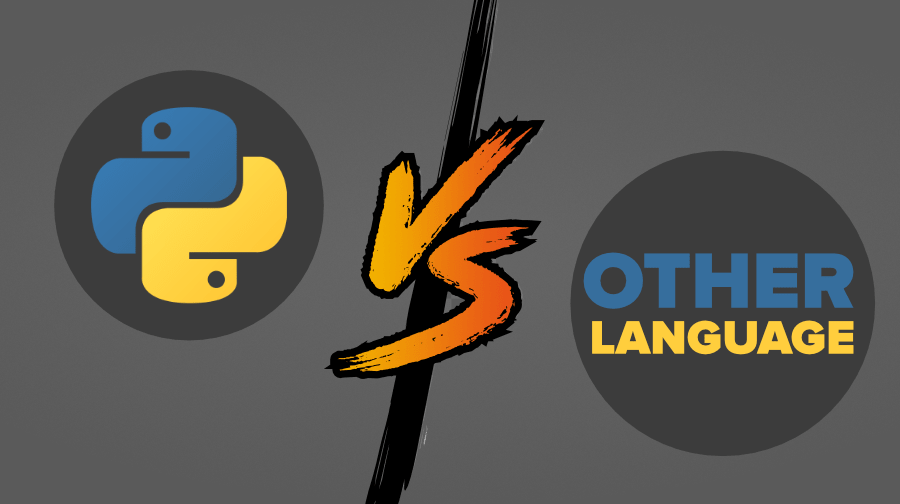Python vs *

Python is widely used in a variety of fields such as web development, scientific computing, machine learning, and lately has established its foothold in the world of data science and data analysis.
it's simplicity & ecosystem gives it an edge over other programming languages as corporate sponsors and giants like Intel, Pixar, IBM, and Google use Python, thus pushing its popularity even further.
Though Python is criticized for its runtime, which is relatively slow when compared to other languages, there is however a workaround to this specific challenge.
When performance takes priority, Python gives you the ability to integrate other, higher-performing languages into your code. Cython is a good example of such a solution. It optimizes your speed without forcing you to rewrite your entire codebase from scratch.
Comparison with some other languages

Python vs. Java
Python prioritizes simplicity and speed of development, while Java focuses on enterprise-level stability and performance. The learning curve difference is significant, you can get productive with Python in weeks, while Java takes months to master the basics.
The code difference is striking. In Java, a simple "Hello World" program requires a full class definition with public static void main methods and system output calls. In Python, it's just one line: `print("Hello World")`. This difference extends to everything you build.
When it comes to development speed, Python lets you build MVPs in weeks, making it perfect for startups and rapid prototyping. Java takes months but offers enterprise-grade stability that large corporations depend on. Python excels in AI/ML, data science, and rapid prototyping, while Java dominates large enterprise applications and Android development.
Python vs. Ruby
Both Python and Ruby are beginner-friendly, but they take different philosophical approaches. Ruby offers multiple ways to solve problems with maximum flexibility, following the principle that there should be more than one way to do something. Python takes the opposite approach, advocating for one clear way to solve problems with maximum readability.
Ruby shines in web applications and startups needing rapid development. It's particularly strong for high-traffic websites thanks to frameworks like Ruby on Rails. Python, however, is more versatile, excelling in data-heavy applications, educational projects, and AI/ML work.
The popularity trends tell an interesting story. Ruby has been declining over the past decade while Python's growth has been explosive. This shift reflects the broader move toward data science and AI, where Python has become the dominant language.
Python vs. JavaScript
JavaScript dominates frontend and real-time applications, while Python excels in backend and data processing. They serve different primary domains - JavaScript is the king of web development and real-time interactions, while Python rules backend services, data processing, and scientific computing.
Performance characteristics differ significantly. JavaScript is faster for real-time interactions thanks to Node.js and its multithreading capabilities. Python is better suited for CPU-intensive, data-heavy tasks where raw computational power matters more than response time.
The learning difficulty is where Python really shines. JavaScript has a steeper learning curve with complex debugging and confusing concepts like closures and prototypes. Python is consistently rated as the most beginner-friendly language available, with syntax that reads almost like English.
Scalability is another key difference. JavaScript applications are highly scalable with multithreading support, while Python is somewhat limited by its Global Interpreter Lock (GIL), though this can be worked around with multiprocessing libraries.
Making the Right Choice
The best programming language isn't about which one is objectively superior, it's about which one fits your specific needs. Choose Python if you're a beginner learning to code, work with data science or AI/ML, need rapid prototyping, value code readability, or want extensive library support.
Java makes sense if you're building large enterprise applications, need maximum performance and stability, work in corporate environments, or develop Android apps. Ruby is perfect if you focus primarily on web development, work at a startup needing fast deployment, or prefer flexible, expressive syntax.
JavaScript is your best bet if you build web applications (frontend or backend), need real-time features, or want to use one language for full-stack development.
The best language is the one that fits your project requirements, team expertise, and long-term goals. Don't get caught up in language wars, focus on solving problems effectively. Each language has its strengths and ideal use cases, and the most successful developers are those who choose the right tool for the job rather than trying to force their favorite language into every situation.
Happy coding! 👨💻
